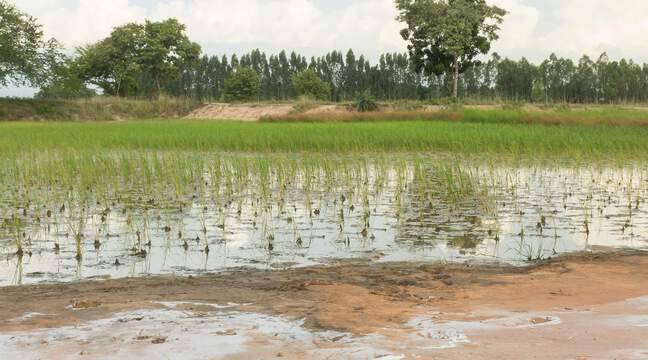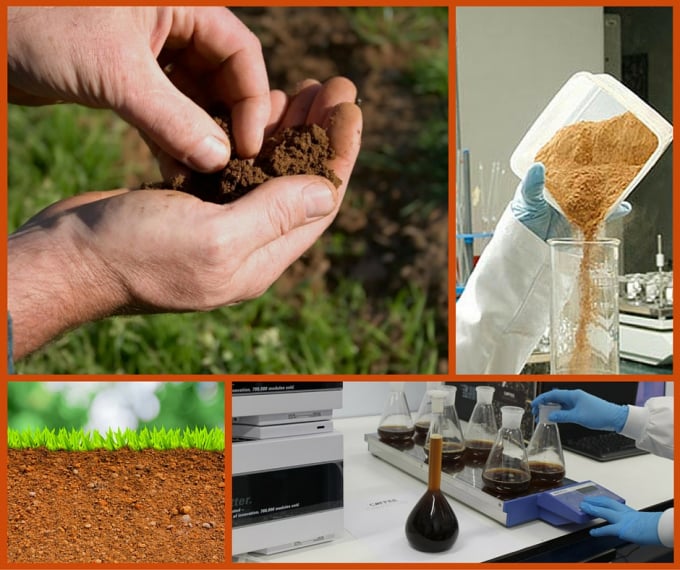November 27, 2025 | 22:39 GMT +7
November 27, 2025 | 22:39 GMT +7
Hotline: 0913.378.918
November 27, 2025 | 22:39 GMT +7
Hotline: 0913.378.918

Soil salinization is considered a major challenge to global food security.
In respect of the annual World Soil Day (December 5th), Experts from the Food and Agriculture Organization of the United Nations (FAO) have recently warned about an alarming situation.
Scientists have highlighted the threat of saltwater intrusion caused by climate change, sea level rise affecting global food security and warned that many countries still lack the ability to analyze soil.
In the speech ahead of the World Soil Day 2021 and its campaign "Halt soil salinization, boost soil productivity", Mr. Qu Dongyu, Director-General of FAO emphasized:
“Soil is the foundation of agriculture, and farmers around the world depend on it to produce, which is estimated 95% of the food humanity consumes… However, our soil is currently facing many risks."
Accordingly, several important and urgent issues at present include:
Management of areas affected by saltwater requires an integrated approach, including sustainable management of soil, irrigation and drainage as well as selection of salt-tolerant crops - plants that are able to grow well in saline soils.
Collection of soil data and capacity-development training in FAO member countries' soil laboratories are essential for managing saltwater-affected soils while laying the foundation towards digital agriculture in the future.
The FAO Director-General also outlined the importance of creating reliable soil data systems as he officially announced the launch of the Global Soil Laboratory Assessment Report.
This is a joint effort of a total of 241 laboratories in 142 countries, led by FAO Global Soil Partnership (GSP) and the Global Soil Laboratory Network (GLOSOLAN) comprising more than 760 laboratories worldwide.
The report also specifies the challenges with 55% of countries surveyed lacking adequate analytical capacity in terms of human resources, synchronous processes and equipment. Many countries are currently unable to meet the demand for soil analysis such as those in Africa, Asia and Eurasia.
Mr. Qu emphasized the importance of investing in soil laboratories to provide reliable data, thereby making appropriate decisions to ensure sustainable soil management and prevent soil degradation.

Soil analysis not only helps us make important decisions but also sound judgments in crop management.
According to the FAO leader, not doing anything to manage and restore soil health can result in serious implications considering the United Nations' Sustainable Development agenda.
Initiatives started and chaired by FAO, including the Global Soil Information System (GloSIS) and the newly launched Global Soil Biodiversity Observatory (GLoSOB), will contribute to the global soil health monitoring and forecasting network.
At the recent COP26 in Scotland, scientists also pointed out the important role soil health plays in climate change mitigation, adaptability and resilience. FAO called on all countries at the event to urgently improve their capability and information in soil by making stronger commitments to sustainable soil management.
The European Union’s recent adoption of a new Soil Strategy can serve as a positive example of setting specific and ambitious goals to improve soil health inside and outside the territory.
Translated by Samuel Pham

(VAN) On November 27, in the meeting with Minister Tran Duc Thang, Mayor Yin Yong shared Beijing’s experience to improve environment and air quality.

(VAN) After 30 years, both sides identified strategic areas of cooperation: sustainable production, increasing coffee value and training for farmers.
/2025/11/27/4910-4-164708_294.jpg)
(VAN) On the afternoon of November 27 in Beijing, Minister of Agriculture and Environment Tran Duc Thang held a working session with several major Chinese enterprises operating in the agriculture and environment sector.

(VAN) The Department of Animal Health issued a provisional guideline requesting local authorities to increase surveillance, collect samples for testing, and conduct epidemiological investigations according to the established procedure.

(VAN) The United Nations recommends that Vietnam utilize data and artificial intelligence to enhance early disaster warnings and reduce GDP losses by 3.2% in the context of climate change.

(VAN) On the morning of November 27 in Beijing, Minister Tran Duc Thang and the Deputy Commissioner General of the General Administration of Customs of China signed a protocol on fresh jackfruit exports.

(VAN) As floodwaters recede, a vast network of irrigation works across eastern Gia Lai is emerging in a state of severe disrepair, with extensive damage demanding urgent restoration ahead of the 2025-2026 winter-spring cropping season.